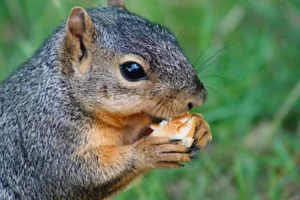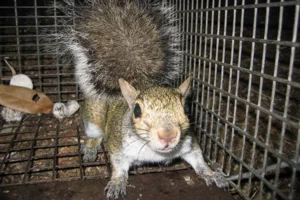
Squirrels are fascinating creatures that are often seen as harmless and even cute. However, there are hidden dangers associated with these furry creatures that homeowners in Dallas need to be aware of. In this article, we will explore the surprising intelligence of squirrels, their ecological role in ecosystems, effective techniques for squirrel prevention, and ethical approaches to dealing with squirrel issues.
Squirrels may seem like simple creatures that scurry around, gathering nuts and acorns, but they are actually quite intelligent. Research has shown that squirrels have the ability to solve complex problems and demonstrate cognitive flexibility. They are known for their impressive memory skills, allowing them to remember the locations of their buried food for months.
But their intelligence goes beyond just memory. Squirrels have been observed engaging in deceptive behavior to protect their food sources. They will pretend to bury nuts in one location while secretly hiding them elsewhere to throw off potential thieves. This level of intelligence is truly remarkable and one that homeowners should not underestimate.
Furthermore, squirrels have a keen sense of observation. They are constantly aware of their surroundings and can quickly adapt to changes in their environment. This ability to assess and respond to their surroundings is crucial for their survival, especially in urban areas where they have to navigate through a maze of human structures.
Another fascinating aspect of squirrel intelligence is their problem-solving skills. They have been observed using creative techniques to access hard-to-reach food sources. For example, squirrels have been seen using tools such as sticks or rocks to pry open nuts or break into bird feeders. This resourcefulness demonstrates their ability to think outside the box and find innovative solutions.

While squirrels may sometimes be considered pests, they play an important ecological role in ecosystems. Squirrels are key seed dispersers, helping to maintain the biodiversity of forests. By burying and forgetting about their cached nuts, squirrels unintentionally plant trees. In fact, some tree species rely on squirrels to disperse their seeds, ensuring their survival.
But their role as seed dispersers is not limited to just trees. Squirrels also play a crucial role in spreading the seeds of various plants and shrubs, contributing to the overall health and diversity of ecosystems. They are like tiny gardeners, unintentionally sowing the seeds of life as they go about their daily activities.
In addition to their role as seed dispersers, squirrels also serve as an important food source for many predators. Birds of prey such as hawks and owls rely on squirrels as a primary food source, while carnivorous mammals like foxes and coyotes also include squirrels in their diet. This predator-prey relationship helps to maintain the balance of ecosystems, preventing any one species from becoming too dominant.
Furthermore, squirrels contribute to nutrient cycling in ecosystems. When they bury nuts and acorns, they inadvertently create small nutrient-rich pockets in the soil. This helps to enrich the soil and promote the growth of other plants and organisms in the area.
Overall, squirrels are not just cute and fluffy creatures that scurry around. They are intelligent problem solvers and important contributors to the health and stability of ecosystems. So the next time you see a squirrel in your backyard, take a moment to appreciate the fascinating role they play in the natural world.
If you want to prevent squirrels from causing damage to your property, there are several natural methods you can try. One effective approach is to plant squirrel-repellent plants around your garden or yard. Examples of plants that squirrels dislike include daffodils, marigolds, and hyacinths.
Not only do these plants add beauty to your landscape, but they also emit scents that squirrels find unpleasant. The strong odors of daffodils, marigolds, and hyacinths act as a natural deterrent, keeping squirrels away from your precious plants and flowers. By strategically placing these squirrel-repellent plants throughout your garden, you create a barrier that squirrels are less likely to cross.
Another natural deterrent is the use of strong scents. Squirrels have a keen sense of smell, so placing cotton balls soaked in peppermint oil or ammonia near squirrel entry points can discourage them from coming near your property. The pungent aroma of these substances overwhelms the squirrels' sensitive noses, making them think twice before venturing into your garden or yard.
Additionally, scattering cayenne pepper or chili powder around your garden can deter squirrels from digging up your plants. The spicy nature of these ingredients irritates the squirrels' paws and mouths, making them less likely to dig or nibble on your precious vegetation. Not only does this method protect your plants, but it also adds a touch of spice to your garden!

If you enjoy bird watching and feeding birds in your backyard, squirrels can be a persistent nuisance. Luckily, there are ways to create squirrel-proof bird feeders. One effective method is to place a squirrel baffle above or below the feeder.
A squirrel baffle is a device that prevents squirrels from climbing up or down to access the bird food. It is usually a dome-shaped or cone-shaped guard made of metal or plastic. When installed correctly, the squirrel baffle creates an obstacle that squirrels cannot overcome, ensuring that only birds can enjoy the food you provide.
Another option is to invest in a weight-activated feeder that closes off access to the bird food when a squirrel's weight is detected. These clever feeders are designed with sensitive mechanisms that detect the weight of a squirrel and automatically close the feeding ports, preventing the squirrels from accessing the food. This ingenious solution allows you to feed the birds without worrying about greedy squirrels depleting the bird food.
Additionally, positioning the bird feeder away from trees or structures that squirrels can jump from will make it more difficult for them to reach the food. By placing the feeder in an open area, away from potential launching points, you create a physical barrier that squirrels must overcome if they want to feast on the bird food. This extra effort may discourage the squirrels and redirect their attention elsewhere.
If squirrels have already become a problem on your property, it's important to deal with them in a humane and ethical manner. Instead of resorting to lethal methods, consider using live traps to capture squirrels. Once captured, you can release them in a suitable habitat away from your property.
When using live traps, it's important to handle them with care to minimize stress and potential harm to the squirrels. Choose traps that are specifically designed for squirrels, ensuring that they have enough space and ventilation. It's also crucial to check the traps regularly to prevent the squirrels from being trapped for extended periods of time.
Before releasing the squirrels, it's essential to identify a suitable habitat for them. This habitat should provide them with access to food, water, shelter, and other resources necessary for their survival. Research local wildlife rehabilitation centers or consult with experts to ensure that you are releasing the squirrels in an appropriate location.
It's crucial to check your local regulations before attempting squirrel removal, as some areas may have specific guidelines or require professional assistance. Keep in mind that relocating squirrels should only be done when they are causing significant damage or posing a threat to human safety.

In some cases, you may want to encourage squirrels to relocate without causing them harm. One method is to make your property less appealing for squirrels by eliminating potential food sources. Clean up fallen fruits and nuts regularly, and secure garbage cans tightly to prevent easy access.
Another way to discourage squirrels from frequenting your property is by removing or trimming tree branches that provide easy access to your home or bird feeders. Squirrels are agile climbers and jumpers, so minimizing their access points can help deter them from causing damage or becoming a nuisance.
Additionally, you can create alternative squirrel-friendly areas in your yard by providing a designated feeding station with squirrel-friendly food, such as corn or peanuts. This can divert squirrels away from areas where they can cause damage and promote a more harmonious coexistence with wildlife.
When setting up a squirrel feeding station, it's important to consider the placement. Choose an area that is away from your home and other structures to prevent squirrels from attempting to enter your property. Regularly clean and refill the feeding station to ensure a steady supply of food and discourage squirrels from seeking other sources.
Furthermore, consider planting squirrel-friendly trees and shrubs in your yard. Squirrels are attracted to certain types of trees, such as oak, hickory, and walnut, which provide them with a natural food source. By incorporating these trees into your landscaping, you can help create a more inviting environment for squirrels, away from areas where they may cause damage.
Although squirrels may appear harmless, they can pose hidden dangers to your Dallas property. Understanding their surprising intelligence, ecological role, and effective prevention techniques is essential for homeowners. By adopting ethical approaches to dealing with squirrel issues, you can ensure the well-being of both your property and these fascinating creatures.